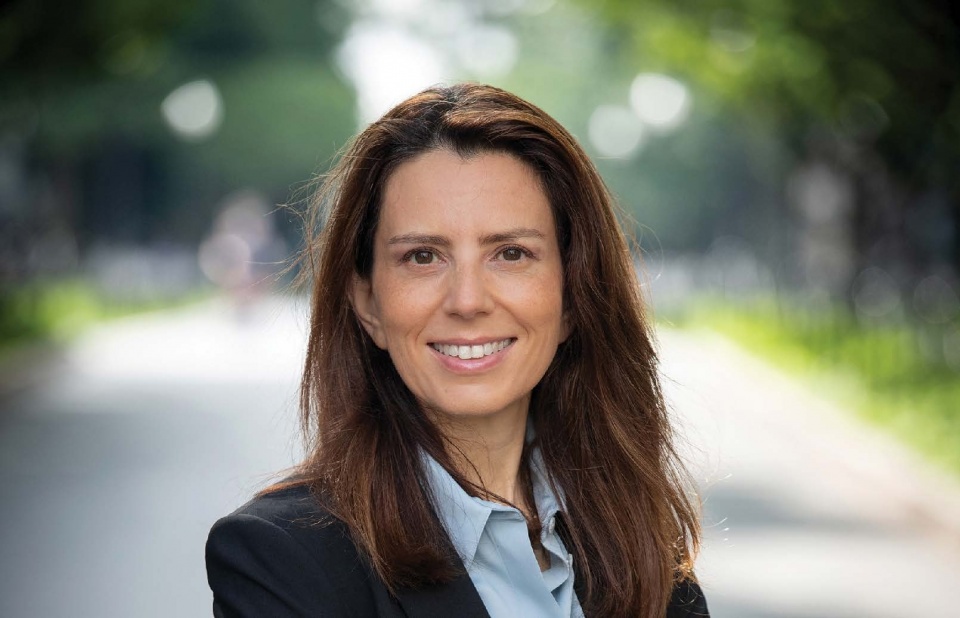Columbia College | Columbia University in the City of New York
Keren Yarhi-Milo

SHAHAR AZRAN
Instead of an ambassadorship, she found her place in academia. Now the Arnold A. Saltzman Professor of War and Peace Studies and director of the Saltzman Institute of War and Peace Studies, Yarhi-Milo is a globally recognized expert on international relations and conflict resolution. She is the author of two award-winning books on international security and foreign policy, and her research specializes in interstate communication, crisis bargaining, and the psychology of leaders and decision makers. Recently, Yarhi-Milo was part of a cohort of conflict experts referenced in a Foreign Affairs article about American credibility following the U.S. withdrawal from Afghanistan.
Yarhi-Milo joined the Columbia faculty in 2020, and though her career journey was circuitous, she always knew she wanted to return to Morningside Heights.
In 1998, after completing mandatory military service in Israel — her fluency in Arabic helped land her in intelligence — she started a B.A. in law and government. “The government part was my passion,” she says.
She was also passionate about New York City. On a childhood trip with her mother, Yarhi-Milo was most interested to see the United Nations and Columbia’s campus. “I had read about Columbia in books, and I just really wanted to be part of that,” she says. “When I walked onto the campus for the first time, I couldn’t believe how beautiful it was. And then it was a matter of when, not if, I would go there.”
While working on her B.A., she moved to New York for an internship at the Mission of Israel to the U.N. It was there she met her husband, Ariel Milo GS’03, then a GS student; he encouraged her to transfer. “I promised everyone back home it would be just for one semester, but now it’s been 22 years,” she laughs.
As a political science major, she took a life-changing class with Robert Jervis, the Adlai E. Stevenson Professor of International Affairs, who died in December 2021. “What he was doing was so brilliant, and it made so much sense to me,” she says. The two had lengthy conversations during his office hours about Middle East security, and Jervis eventually became her mentor. “Bob is the reason I’m in this field. After I graduated I was very clear about going into academia.”
Yarhi-Milo earned a master’s and a Ph.D. in political science from Penn, then worked as a post-doc at Harvard. She was a tenured associate professor of politics and international affairs at Princeton for 10 years before getting the call to come back to campus.
Though she’s relatively new to the faculty, Yarhi-Milo is already deeply involved. She’s a member of the University Senate and the Joint CC-GS Committee on Instruction, was recently selected as a Provost Leadership Fellow and is heading the Arts and Sciences committee that is studying a potential College expansion. She’s also led the charge to make the Saltzman Institute an intellectual home for Columbia undergrads. “I want this to be a place where their ideas about events and curriculum matter,” she says. Yahri-Milo has already launched two new programs at the institute: The Saltzman Student Scholars Program and the Emerging Voices in National Security and Intelligence program.
Since Yarhi-Milo’s own path was forged through mentorship, it’s understandable that it’s a priority for her. “I know how fundamental the experience of being an undergraduate is — that’s when I made decisions about what I wanted to do with my life,” she says. “It was by sitting in a class and feeling like my professor was a role model. That’s what I want to do and be.”
One of her favorite classes to teach is a seminar on U.S. foreign policy and crisis decision making that incorporates theory and literature from psychology, economics, behavioral economics, sociology and neuroscience. “My scholarship helped to push this field — the study of decision making — so it’s very natural for me to teach,” she says. “Every year there are international crises that are happening, so the students are able to make connections between what they are reading and the events they are experiencing. It’s new and engaging every time.”
In addition to her busy Columbia schedule, Yarhi-Milo is a “very hands-on” mom to her sons, ages 13 and 10, and she always has numerous writing projects in progress. Articles about nuclear commitments and cyberattacks are underway, and an idea for a third book is in the works.
“The challenge is how to juggle the service and the scholarship,” she says. “But that’s something I’ll never compromise on.”
Issue Contents
Published three times a year by Columbia College for alumni, students, faculty, parents and friends.
Columbia Alumni Center
622 W. 113th St., MC 4530, 6th Fl.
New York, NY 10025
212-851-7852
cct@columbia.edu
Columbia Alumni Center
622 W. 113th St., MC 4530, 4th Fl.
New York, NY 10025
212-851-7488
ccalumni@columbia.edu

